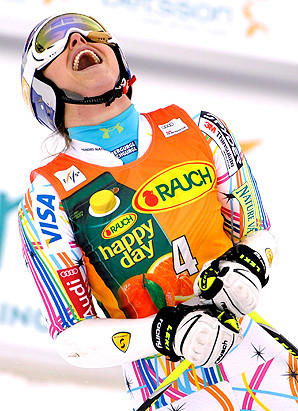Vonn has quietly dominated ski racing like few others in history
On March 9 (before dawn in much of the U.S.) in Are, Sweden, Vonn, 27, clinched her fourth World Cup overall alpine championship, a cumulative title based on results in all five ski racing disciplines, emblematic of the best all-around ski racer in the world. Vonn wrapped up the title by winning a two-run giant slalom race by .48 seconds -- a wide margin in ski racing -- over Federica Brignone of Italy.
But at this point in this season, it doesn't really matter who finished second. Vonn has now scored 1,808 race points in the 2012 World Cup (first place in a race is worth 100 points) and even with five races left, Vonn leads Tina Maze of Slovenia by an insurmountable 554 points and last year's champion, Maria Hoefl-Riesch of Germany, by a whopping 773. It's like clinching an NFL division in Week 10. In winning her fourth title -- a U.S. record; Phil Mahre won three in the 1980s -- Vonn has reduced the rest of the women's World Cup to background singers in a stage production, Pips to her Gladys; Crickets to her Buddy Holly (stop me, please).
From all of this success emerges a curious irony: Vonn's dominance can diminish her own greatness, by making the task seem easier than it is. Winning so consistently and off the grid of mainstream sports, she forces the public, almost by reflex, into a state of bored acceptance. Think of it as the Meryl Streep Effect: Her? Again? Think of it as Jordan, who had to retire, unretire, and then get really sick on national television during a playoff game for us to truly appreciate the magnitude of his work because he had done brilliant things with such ease. So in the same way, if not with the same audience, it would be wrong to let Vonn's era age by another day without fully appreciating it.
What is most remarkable about Vonn's 2012 is that she has elevated the level of her work in a year of personal turmoil. In November she announced that she and her husband, former U.S. racer Thomas Vonn, were divorcing. Thomas Vonn, nine years Lindsey's senior, had been part of her life since Lindsey was a teenager; in recent years he had participated in much of her coaching and equipment setup and even consoled her in starting gates when her nerves crumbled.
It often seemed that Team Vonn -- which also includes coaches from the U.S. Ski Team and Red Bull, Vonn's primary sponsor -- was a fragile support network that couldn't withstand the loss of a key working part.
Wrong. Vonn has won 11 races this season, matching the best of her career. (The all-time women's single season record is 14 by Annemarie Moser-Proell of Austria in 1989; Vonn still has a shot at that.) The one hole in Vonn's game before 2012 had been giant slalom and this year she won two of those. "I just wanted to prove to myself that I could ski ... myself," Vonn said on a teleconference with U.S. journalists Friday afternoon. "But I've definitely had more focus than ever before. It's really nice to have those two minutes where I don't have to think about anything else but skiing."
It has been a year of intense change. Vonn, who has kept her married name, has reunited with her father, Alan Kildow; they had been estranged because he didn't approve of his daughter's relationship with Thomas Vonn. Her younger sister, Laura, was in Sweden to see Wednesday's win. And Vonn, often an island among teammates (not without some tension), says she has become closer with them now. "I'm having more fun with my life," she said Wednesday. "It's been a really unique experience."
Her victory in Sweden forces writers to again become list-makers, pulling up a catalog of Vonn's work since starting the season with a giant slalom win on a glacier in Soelden, Austria last October and then three consecutive firsts on a speed hill at Canada's Lake Louise resort that she adores. ("[The fast start] was really important," Vonn said. "That confidence carried me through ... to right now, actually.")
So here comes the waterfall of numbers: In addition to breaking Mahre's record, Vonn increased her U.S. record to 52 World Cup race victories. Only two women have more: Switzerland's Vreni Schneider with 55 and Moser-Proell with 62. Barring injury, Vonn seems certain to take down both of them before the torch is lit in Sochi for 2014. (The all-time men's leader is Ingemar Stenmark of Sweden, who won 86 races from 1973-'86; Vonn has a shot at him, too). Vonn's six overalls is second to Moser-Proell's six and that's clearly in sight, as well. She has a chance to leave her sport as, statistically, the greatest racer in history. (For those wondering, the name-recognized Hermann Maier -- the Hermann-ator -- won 54 World Cup races in his career; the next-best U.S. skier behind Vonn is Bode Miller, long gone in the rearview mirror with 33 wins).
One more number: With five races left in the season, Vonn has a chance to become the first woman in history to score 2,000 points in a World Cup season. The record is 1,970 by Janica Kostelic of Croatia in 2006. "Two-thousand never really seemed possible," said Vonn. "I'm closer than I ever thought I would get. [Friday] was a huge day for me, but I still have a lot of motivation."
So there it is. At the top of her sport, Vonn chases arbitrary records culled from an arcane scoring system. And it's understandable, because, this winter, the customary challenges have proved unworthy. Mountains. Other skiers. The clock. Vonn has punished them all. So she goes after the math.





